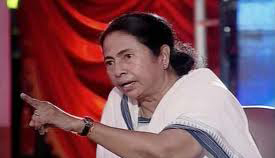
?Kolkata, May 19: West Bengal Chief Minister Mamata Banerjee on Friday stormed out of a CNN-IBN show on one year of Trinamool Congress rule, after accusing the audience, which consisted of students, to be Maoists and CPM cadre.
The Trinamool Congress chief lost her cool and stormed out of the interactive TV session when members of the audience questioned her on the arrest of Jadavpur University professor Ambikesh Mahapatra and increased rate of crime against women in the state, including the controversial Park Street rape case.
Alleging that the professor was a member of the CPM cadre, the West Bengal Chief Minister said, "It is not a cartoon. We love cartoons. Cartoon is a different thing. He is a CPM man. He misused the e-mail of his society people without their consent. He forwarded it to 60 people."
Mamata also hit out at the CPM, accusing it of working hand-in-glove with the Maoists.
While responding to the question on the cartoon controversy, Mamata slammed the students among the audience saying, "I know that Maoist people and CPM are putting up these questions."
The Chief Minister even went on to ask the girl student who had posed the question if she was a Maoist, asking, "Why students from outside Jadavpur University are not here?"
When asked by the students about crime against women in the state, the Chief Minister got furious. She argued there was no crime against women in the state, and accused the students of being CPM cadres and asking "Maoist questions".
Mamata claimed that it could even be verified that the members of the audience were Maoists and CPM cadres, and they were asking nothing but "questions of the Maoists and the CPM".
Post her walkout, an angry audience spoke out against Mamata's behaviour and expressed their dismay at the sorry state of affairs in the state.
The girl who was accused by the Chief Minister of being a Maoist cadre, said, "I study political science, I know of it in theory. I don't see it in practice. I mean, I am just asking her a question. I didn't provoke her. I didn't instigate her to do what she did. She put a label on me and she walked off. That's what she's been doing. She put a label on the rape victims even before the police had done their dues."
Another member of the audience said, "Looking at the chair, I stood like a lamp post here and that kind of symbolises what is happening in West Bengal. There is one post and everyone else is a lamp post. There is no other work in the Cabinet."
"I am not officially attached to any party. What amazes me as a common man is that if a head of the state behaves that way, then how do we expect local TMC people to behave?" another member asked.
"I have come back after 20 years to this state to try and do some work here because I was so enthused by the change and well... I am going back," said another.
"When she came here, didn't she know that she was going to be asked uncomfortable questions? What did she expect? That people will pat her back and say that you have done very good work? Wasn't she prepared for all these uncomfortable questions?" asked another.
"If you want to engage the youth, involve them in politics and governance. You need to be prepared to give honest answers and to suit their fears and address them."
"Whatever happened, we can joke about it, we can laugh about it but underlining that laughter is a sense of utter despair and the fact that she has landed exactly in that position of political intolerance of defence she voted out the CPM," said an audience member. "Every time she speaks she quotes from Ram Chandra Paramhans and Swami Vivekanand and Tagore and what she displayed here, if she could have just level headedly took the questions. If she thought that we were the ones who were wrong, she should have come out with a logic and told us that you are wrong because of these reasons and not just label somebody as a Maoist and walk off. That just shows that she doesn't have a hallmark of a true leader."
"She has been quoted in Time magazine as being a very powerful woman, Hilary Clinton has rave reviews about her. I wonder what these people will say when they hear about how she behaves with common citizens," said another.
"She has the perfect platform, she just let it go. This is unacceptable," another member added.






Comments
Add new comment